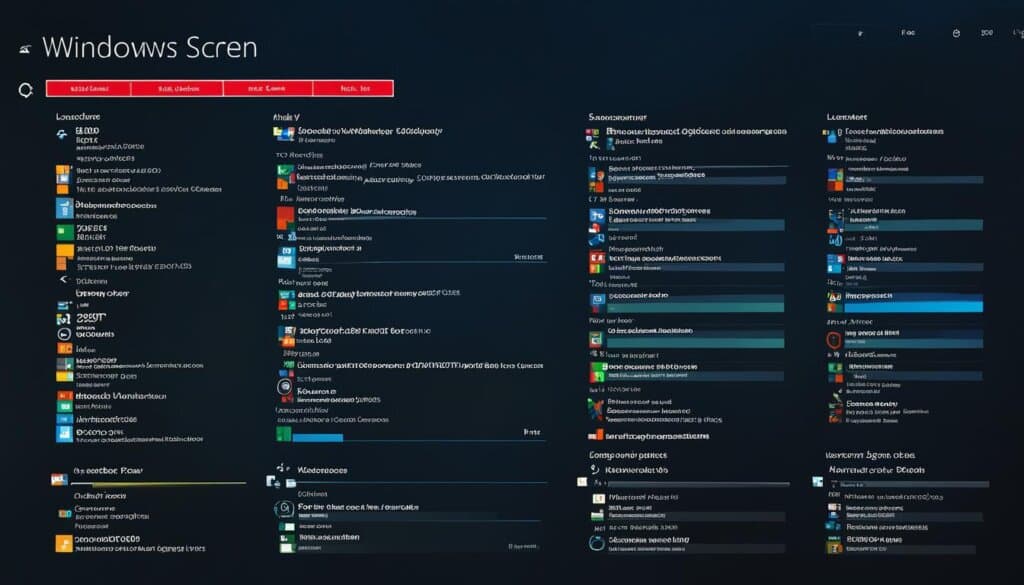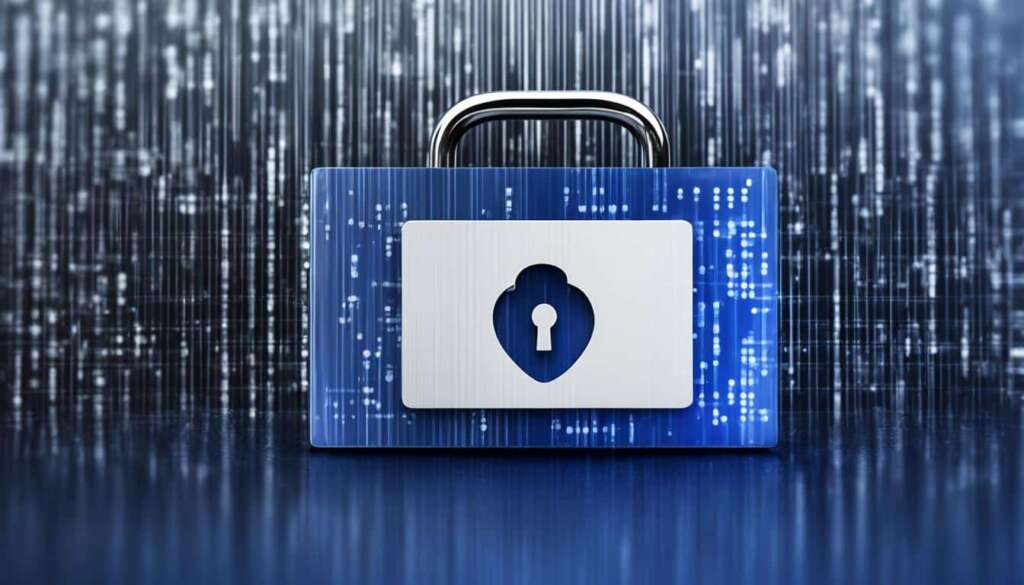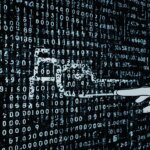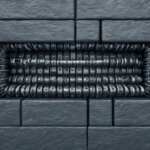Table of Contents
BitLocker is a vital Windows security feature that provides drive encryption, ensuring robust data protection. With BitLocker, users can safeguard their valuable information from theft or unauthorized access, offering peace of mind and enhanced security.
As a Windows security feature, BitLocker encrypts entire volumes, making data inaccessible to unauthorized individuals. This encryption is especially crucial for protecting against the threats of data theft or exposure in situations where devices are lost, stolen, or improperly decommissioned.
BitLocker goes beyond traditional file and system protections by rendering data inaccessible even when devices are decommissioned or recycled. By encrypting the entire volume, BitLocker ensures that data cannot be accessed by unauthorized individuals, providing comprehensive protection for sensitive information.
To maximize the security offered by BitLocker, it is recommended to use it in conjunction with a Trusted Platform Module (TPM). A TPM is a common hardware component installed on Windows devices that enhances the overall security of BitLocker encryption.
BitLocker is an essential tool for Windows users looking to fortify their data security. By encrypting their drives with BitLocker, individuals and organizations can mitigate the risks associated with data theft, unauthorized access, and device decommissioning.
Practical Applications of BitLocker
BitLocker, a robust data security feature, offers numerous practical applications that enhance file and system protections, ensuring data confidentiality and preventing unauthorized access. Let’s explore some key scenarios where BitLocker proves invaluable:
1. Mitigating Unauthorized Data Access
BitLocker safeguards against unauthorized access on lost or stolen devices by fortifying file and system protections. It thwarts attempts to breach security, whether through software attack tools or transferring the device’s hard drive to another system. By rendering data on BitLocker-protected devices inaccessible, it provides a strong deterrent against data breaches.
2. Ensuring Data Security during Device Decommissioning and Recycling
BitLocker offers a vital layer of protection during the decommissioning or recycling of devices. By encrypting the data, it ensures that unauthorized individuals cannot access sensitive information. This added security measure safeguards against data breaches and upholds data privacy regulations.
Implementing BitLocker in the decommissioning process prevents unauthorized access and potential data leaks, ensuring the safe disposal or repurposing of devices.
3. Safe Usage of Portable Storage Devices
BitLocker extends its practicality to portable storage devices, such as USB flash drives. It enables users to encrypt these devices, ensuring data protection even during data transfers between devices or locations. This heightened security prevents unauthorized access to sensitive information stored on portable storage media.
| Applications | Benefits |
|---|---|
| Prevents unauthorized data access | Enhances file and system protections |
| Ensures data security during decommissioning and recycling | Protects sensitive information from unauthorized access |
| Secures data on portable storage devices | Prevents unauthorized access during data transfers |
The practical applications of BitLocker, including mitigating unauthorized data access, ensuring data security during device decommissioning and recycling, and safe usage of portable storage devices, highlight its versatility in safeguarding sensitive information and protecting against unauthorized access.
BitLocker and TPM: Enhanced Security Measures
BitLocker provides maximum protection when used with a Trusted Platform Module (TPM). The TPM is a hardware component that works with BitLocker to ensure device integrity, preventing tampering while the system is offline.
For enhanced security, BitLocker can utilize multifactor authentication, such as a personal identification number (PIN) or a startup key. These additional measures ensure that the device cannot start or resume from hibernation without the correct PIN or startup key, further safeguarding against unauthorized access.
Benefits of BitLocker and TPM:
- Enhanced device integrity
- Multifactor authentication
- Protection against unauthorized access
By combining BitLocker with TPM and implementing multifactor authentication, users can significantly enhance the security of their devices and protect sensitive data from potential threats.
“BitLocker, when used with TPM, adds an extra layer of assurance that the device hasn’t been tampered with and provides peace of mind knowing that confidential information is kept secure.” – John Smith, IT Security Expert
To illustrate the integration of BitLocker and TPM, consider the following usage scenario:
| Device Security Measure | Description |
|---|---|
| BitLocker | Full-disk encryption for data protection |
| TPM | Hardware component ensuring device integrity |
| Personal Identification Number (PIN) | Multifactor authentication for additional security |
As shown in the table above, when BitLocker is used in conjunction with TPM and a personal identification number (PIN), users can enjoy enhanced protection against unauthorized access and ensure the integrity of their devices.
BitLocker System Requirements
To maximize the functionality of BitLocker, it is important to ensure that your device meets specific system requirements. These requirements include:
- A Trusted Platform Module (TPM) of version 1.2 or later: The TPM provides a system integrity check for BitLocker, enhancing the security of your device.
- A Trusted Computing Group (TCG)-compliant BIOS or Unified Extensible Firmware Interface (UEFI) firmware: This establishes a chain of trust for the preboot startup, ensuring the integrity of your device.
- At least two drives: The hard disk must be partitioned into an operating system drive and a system drive.
- The operating system drive must be formatted with the NTFS file system, ensuring compatibility with BitLocker.
- The system drive must differ from the operating system drive, should not be encrypted, and must be formatted with the FAT32 file system (for UEFI-based firmware) or NTFS file system (for BIOS firmware).
By meeting these system requirements, you can ensure that BitLocker functions optimally and provides the necessary security for your data.
Windows Edition and Licensing Requirements for BitLocker
To enable the robust security features of BitLocker, it is crucial to understand the specific Windows editions and license entitlements that support its functionality. BitLocker is available on several editions of Windows, each with its own licensing requirements. These editions include:
- Windows Pro
- Windows Enterprise
- Windows Pro Education/SE
- Windows Education
Each of these editions grants license entitlements for BitLocker enablement, ensuring that you can leverage the full potential of this powerful encryption tool. For instance, Windows Pro/Pro Education/SE, Windows Enterprise E3, Windows Enterprise E5, Windows Education A3, and Windows Education A5 all provide BitLocker enablement license entitlements.
When enabling BitLocker, it is essential to ensure that you are using the appropriate Windows edition and that you meet the necessary licensing requirements. By adhering to these requirements, you can take advantage of BitLocker’s advanced encryption capabilities and enhance the security of your data.

With the right Windows edition and proper licensing, you can unleash the power of BitLocker to protect your sensitive information and secure your devices.
Device Encryption with BitLocker
BitLocker Device Encryption, a feature of BitLocker, offers automatic encryption for select devices. This functionality enables full-disk encryption on supported Windows versions, provided that the device meets specific security requirements.
Automatic Encryption for Enhanced Information Protection
BitLocker Device Encryption ensures that sensitive information remains secure by encrypting the operating system (OS) drive and fixed drives. However, it does not encrypt external or USB drives.
By default, BitLocker Device Encryption is enabled on compatible devices, providing an additional layer of protection for valuable data. It is particularly useful for safeguarding sensitive information against unauthorized access.
Encryption for Portable Storage
In addition to device encryption, BitLocker can be used to encrypt portable storage media, such as USB flash drives. This feature ensures the protection of data even when it is being transferred between devices or locations.
With BitLocker, portable storage remains encrypted and secure, offering peace of mind for users who frequently handle sensitive information on the go.
“BitLocker Device Encryption provides automatic encryption for select devices, offering enhanced information protection and encryption for portable storage.”
Who Should Use BitLocker and Its Limitations
BitLocker is a valuable tool for business organizations seeking to uphold cybersecurity standards and safeguard sensitive data. It proves to be equally useful for individual users who store confidential information on their computers, as well as digital nomads and remote workers. However, it’s important to note that BitLocker may not be necessary for everyone, particularly casual computer users or those who don’t handle sensitive data.
BitLocker does have its limitations, one of which is compatibility issues with older machines. While it offers data encryption and protection, it may require additional layers of security in certain cases. As such, it is advisable for organizations to consider other security measures alongside BitLocker to enhance their overall cybersecurity efforts.
Nevertheless, BitLocker remains a powerful tool for those who need to encrypt their data and protect sensitive information. By utilizing BitLocker, individuals and organizations alike can strengthen their security posture and ensure that their data remains secure, thereby mitigating the risk of unauthorized access and potential data breaches.
FAQ
What is BitLocker?
BitLocker is a Windows security feature that provides encryption for entire volumes, safeguarding data from theft or unauthorized access.
How does BitLocker enhance file and system protections?
BitLocker renders data inaccessible on BitLocker-protected devices, preventing unauthorized access through software attack tools or transferring the device’s hard drive to a different device.
What is a Trusted Platform Module (TPM) and how does it work with BitLocker?
The TPM is a common hardware component installed on Windows devices that works with BitLocker to ensure device integrity and provides additional security measures such as multifactor authentication.
What are the system requirements for BitLocker?
For BitLocker to function optimally, the device must have TPM 1.2 or later versions, TCG-compliant BIOS or UEFI firmware, and the hard disk must be partitioned with at least two drives using specific file systems.
Which editions of Windows support BitLocker?
BitLocker is available on specific editions of Windows, including Windows Pro, Windows Enterprise, Windows Pro Education/SE, and Windows Education, each with specific license entitlements for BitLocker enablement.
What is BitLocker Device Encryption?
BitLocker Device Encryption is a feature that provides automatic encryption for some devices, encrypting the OS drive and fixed drives to protect sensitive information.
Who should use BitLocker and what are its limitations?
BitLocker is beneficial for business organizations that need to comply with cybersecurity standards and protect sensitive data. However, it may not be necessary for casual computer users and may have compatibility issues with older machines, requiring additional security measures in some cases.













